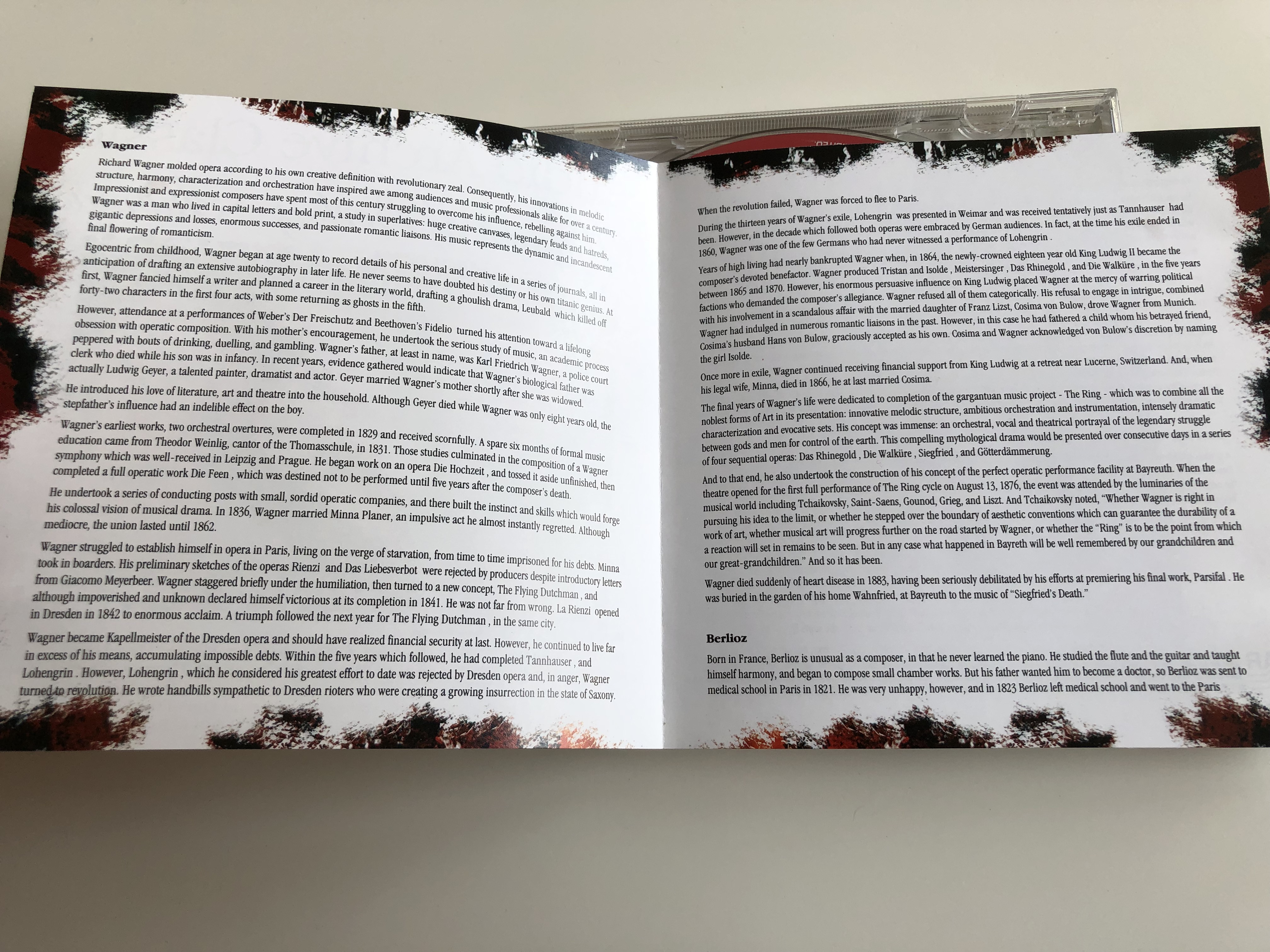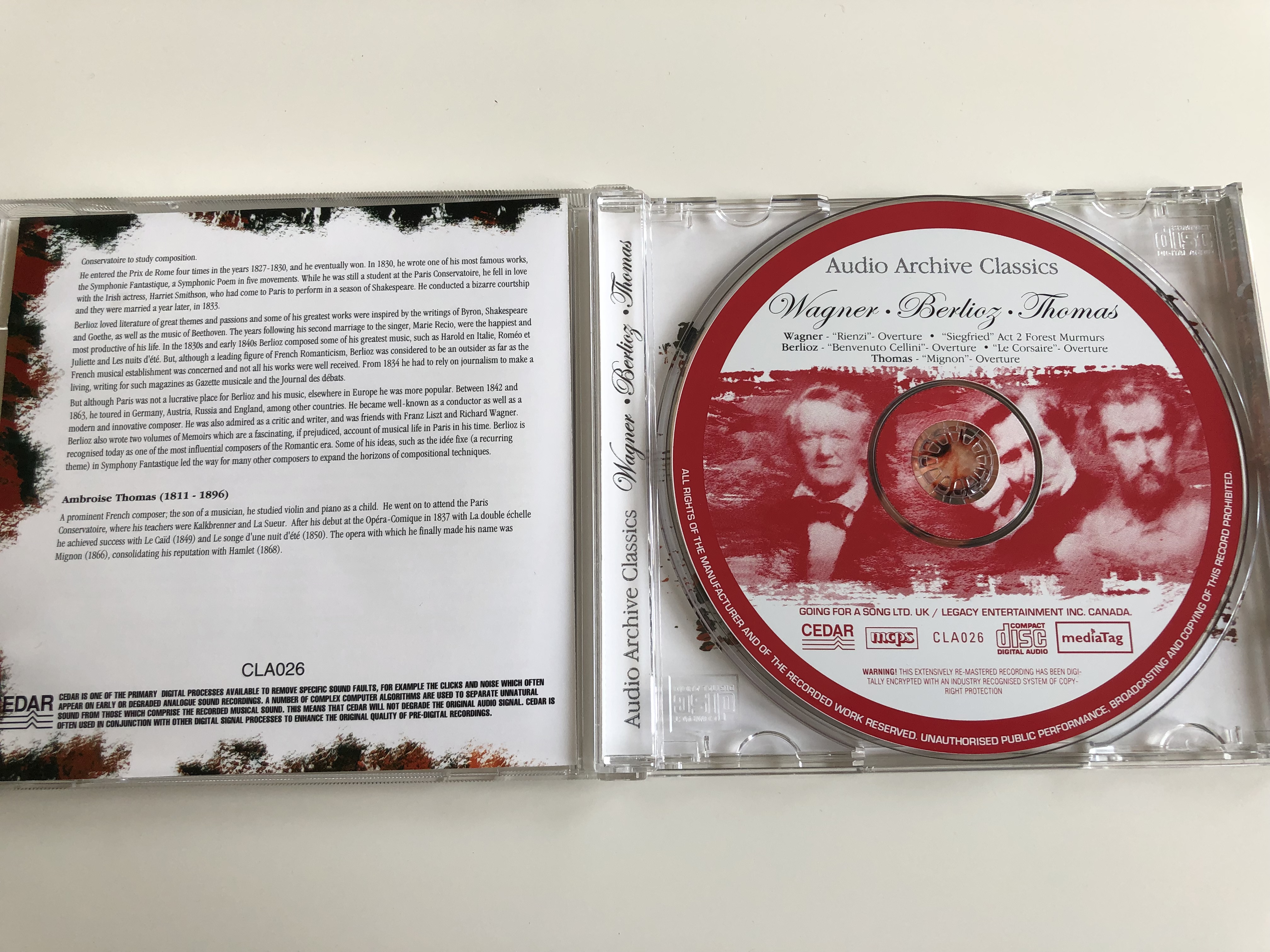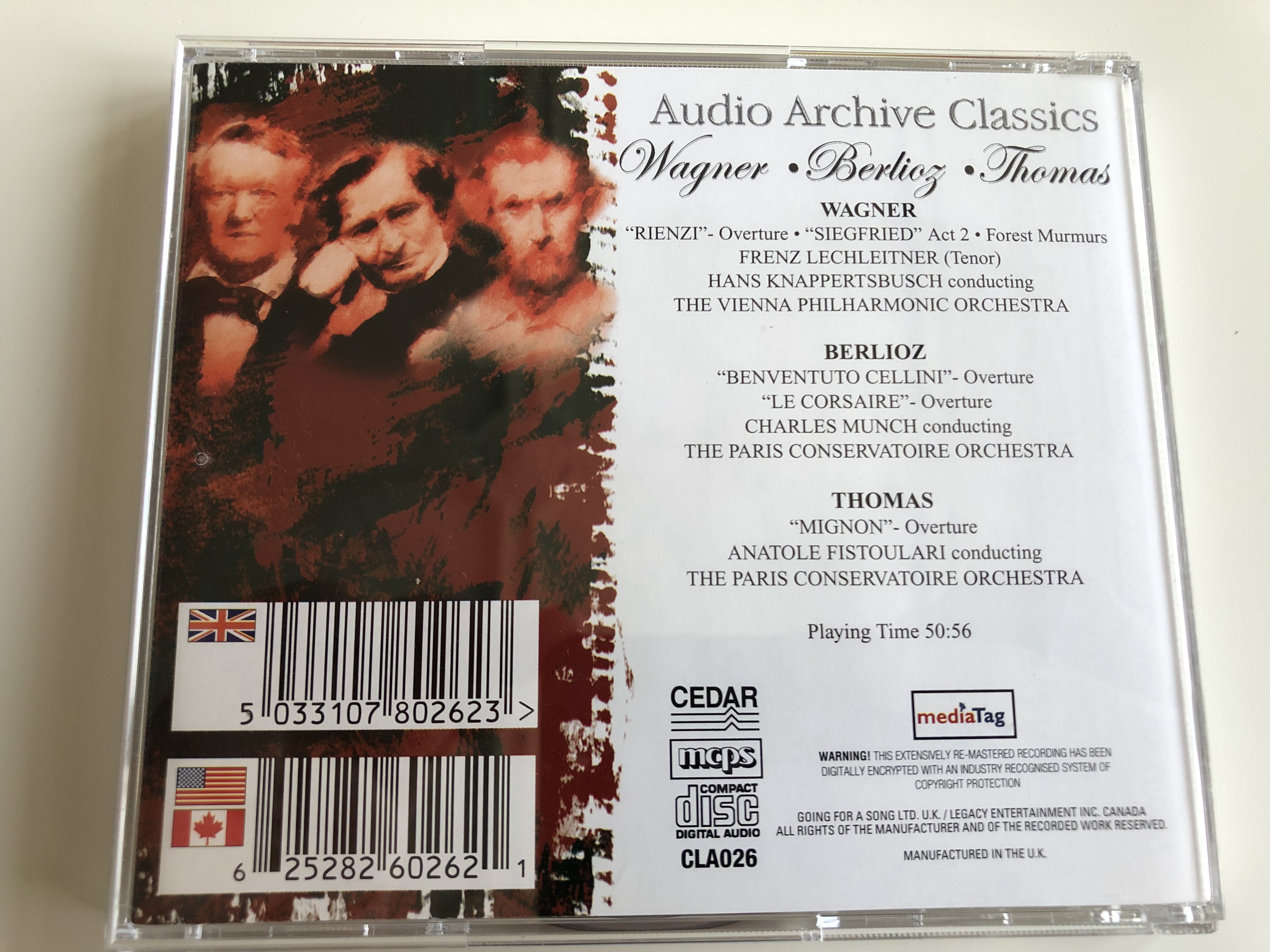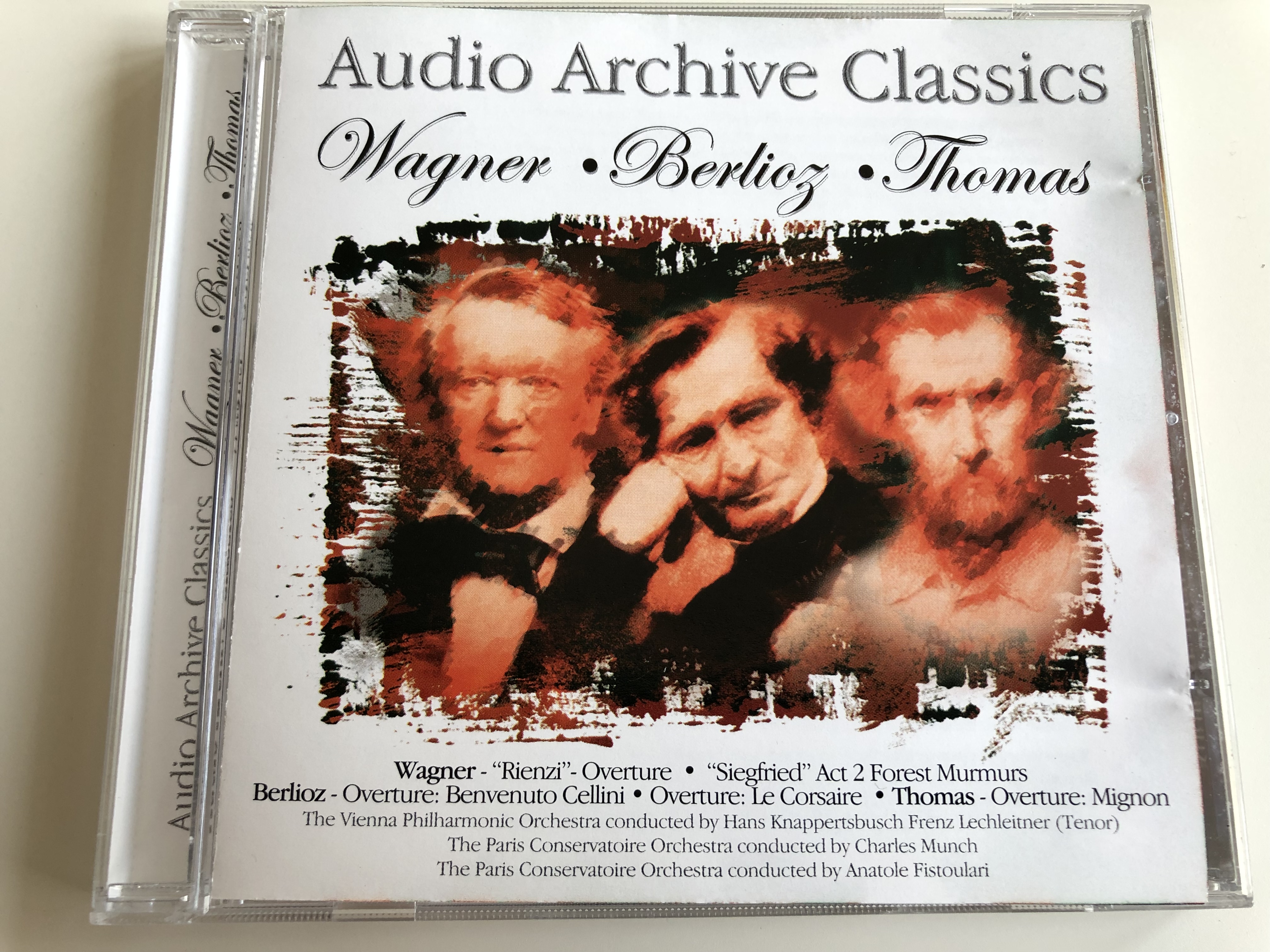Description
Audio Archive Classics: Wagner, Berlioz, Thomas
Audio CD 2005
Wagner - "Rienzi" - Overture, Siegfried" Act 2 Forest Murmurs, Berlioz - Overture: Benvenuto Cellini, Overture: Le Corsaire, Thomas - Overture: Mignon
The Vienna Philharmonic Orchestra conducted by Hans Knappertsbusch Frenz Lechleitner (Tenor)
The Paris Conservatoire Orschestra conducted by Charles Munck
The Paris Conservatoire Orschestra conducted by Anatole Fistoulari
UPC 5033107802623 / 625282602621
Made in UK
Tracklist:
Wagner
"Rienzi" - Overture : "Siegfried" Act 2 : Forest Murmurs
Frenz Lechleitner (Tenor)
Hank Knappertsbusch Conducting
The Vienna Philharmonic Orchestra
Berlioz
"Benventuto Cellini"-Overture
"Le Corsaire"-Overture
Charles Munch conducting
The Paris Conservatoire Orchestra
Thomas
"Mignon"-Overture
Anatole Fistoulari conducting
The Paris Conservatoire Orchestra
Playing Time: 50:56
Wilhelm Richard Wagner (/ˈvɑːɡnər/; German: [ˈʁɪçaʁt ˈvaːɡnɐ] 22 May 1813 – 13 February 1883) was a German composer, theatre director, polemicist, and conductor who is chiefly known for his operas (or, as some of his later works were later known, "music dramas"). Unlike most opera composers, Wagner wrote both the libretto and the music for each of his stage works. Initially establishing his reputation as a composer of works in the romantic vein of Carl Maria von Weber and Giacomo Meyerbeer, Wagner revolutionised opera through his concept of the Gesamtkunstwerk ("total work of art"), by which he sought to synthesise the poetic, visual, musical and dramatic arts, with music subsidiary to drama. He described this vision in a series of essays published between 1849 and 1852. Wagner realised these ideas most fully in the first half of the four-opera cycle Der Ring des Nibelungen (The Ring of the Nibelung).
His compositions, particularly those of his later period, are notable for their complex textures, rich harmonies and orchestration, and the elaborate use of leitmotifs—musical phrases associated with individual characters, places, ideas, or plot elements. His advances in musical language, such as extreme chromaticism and quickly shifting tonal centres, greatly influenced the development of classical music. His Tristan und Isolde is sometimes described as marking the start of modern music.
Wagner had his own opera house built, the Bayreuth Festspielhaus, which embodied many novel design features. The Ring and Parsifal were premiered here and his most important stage works continue to be performed at the annual Bayreuth Festival, run by his descendants. His thoughts on the relative contributions of music and drama in opera were to change again, and he reintroduced some traditional forms into his last few stage works, including Die Meistersinger von Nürnberg (The Mastersingers of Nuremberg).
Until his final years, Wagner's life was characterised by political exile, turbulent love affairs, poverty and repeated flight from his creditors. His controversial writings on music, drama and politics have attracted extensive comment, notably, since the late 20th century, where they express antisemitic sentiments. The effect of his ideas can be traced in many of the arts throughout the 20th century; his influence spread beyond composition into conducting, philosophy, literature, the visual arts and theatre.
Louis-Hector Berlioz (/ˈbɛərlioʊz/; French: [ɛktɔʁ bɛʁljoz]; 11 December 1803 – 8 March 1869) was a French Romantic composer. His output includes orchestral works such as the Symphonie fantastique and Harold in Italy, choral pieces including the Requiem and L'enfance du Christ, his three operas Benvenuto Cellini, Les Troyens and Béatrice et Bénédict, and works of hybrid genres such as the "dramatic symphony" Roméo et Juliette and the "dramatic legend" La damnation de Faust.
The elder son of a provincial doctor, Berlioz was expected to follow his father into medicine, and he attended a Parisian medical college before defying his family by taking up music as a profession. His independence of mind and refusal to follow traditional rules and formulas put him at odds with the conservative musical establishment of Paris. He briefly moderated his style sufficiently to win France's premier music prize, the Prix de Rome, in 1830 but he learned little from the academics of the Paris Conservatoire. Opinion was divided for many years between those who thought him an original genius and those who viewed his music as lacking in form and coherence.
At age 22 Berlioz fell in love with the Irish Shakespearean actress Harriet Smithson, and he pursued her obsessively until she finally accepted him seven years later. Their marriage was happy at first but eventually foundered. Harriet inspired his first major success, the Symphonie fantastique, in which an idealised depiction of her occurs throughout.
Berlioz completed three operas, the first of which, Benvenuto Cellini, was an outright failure. The second, the huge epic Les Troyens (The Trojans), was so large in scale that it was never staged in its entirety during his lifetime. His last opera, Béatrice et Bénédict – based on Shakespeare's comedy Much Ado About Nothing – was a success at its premiere but did not enter the regular operatic repertoire. Meeting only occasional success in France as a composer, Berlioz increasingly turned to conducting, in which he gained an international reputation. He was highly regarded in Germany, Britain and Russia both as a composer and as a conductor. To supplement his earnings he wrote musical journalism throughout much of his career; some of it has been preserved in book form, including his Treatise on Instrumentation (1844), which was influential in the 19th and 20th centuries. Berlioz died in Paris at the age of 65.
Charles Louis Ambroise Thomas (French: [ɑ̃bʁwaz tɔma]; 5 August 1811 – 12 February 1896) was a French composer and teacher, best known for his operas Mignon (1866) and Hamlet (1868).
Born into a musical family, Thomas was a student at the Conservatoire de Paris, winning France's top music prize, the Prix de Rome. He pursued a career as a composer of operas, completing his first opera, La double échelle, in 1837. He wrote twenty further operas over the next decades, mostly comic, but he also treated more serious subjects, finding considerable success with audiences in France and abroad.
Thomas was appointed as a professor at the Conservatoire in 1856, and in 1871 he succeeded Daniel Auber as director. Between then and his death at his home in Paris twenty-five years later, he modernised the Conservatoire's organisation while imposing a rigidly conservative curriculum, hostile to modern music, and attempting to prevent composers such as César Franck and Gabriel Fauré from influencing the students of the Conservatoire.
Thomas' operas were generally neglected during most of the 20th century, but in more recent decades they have experienced something of a revival both in Europe and the US.





























